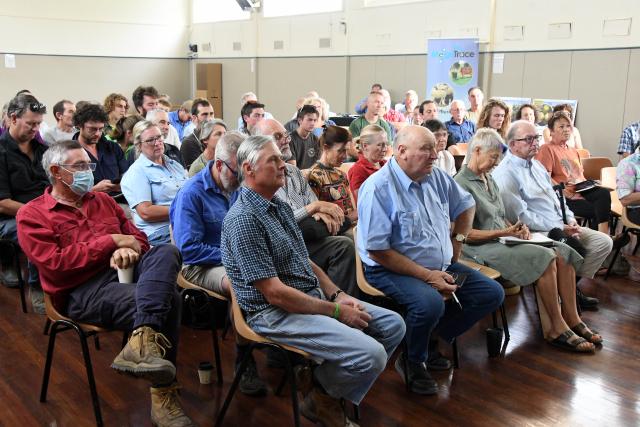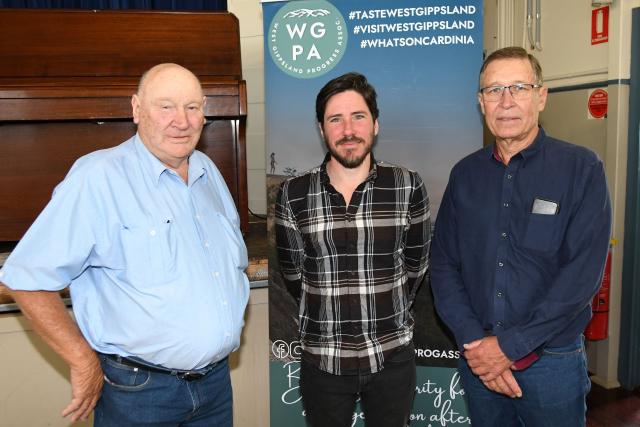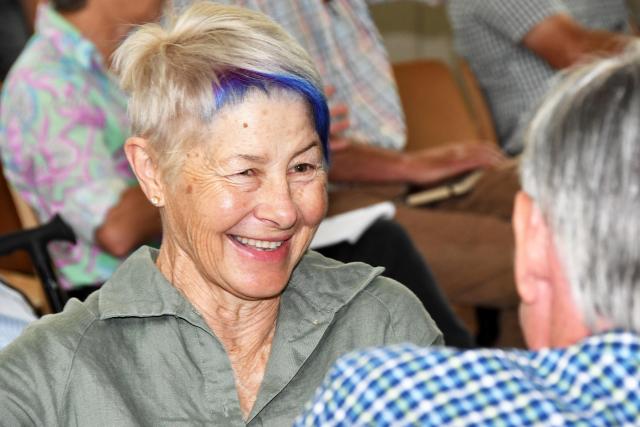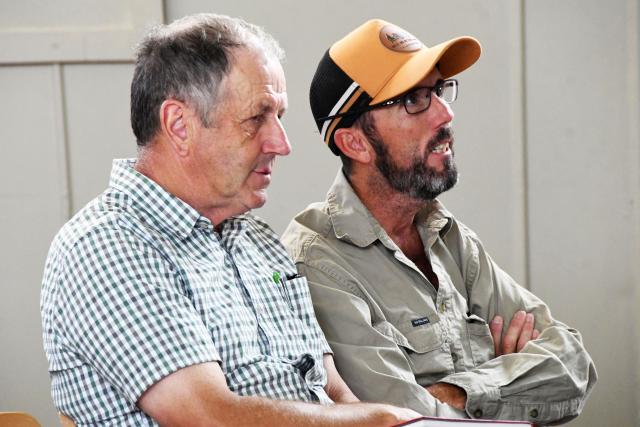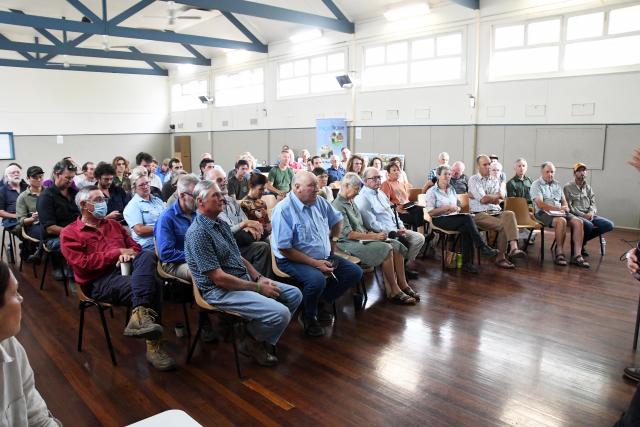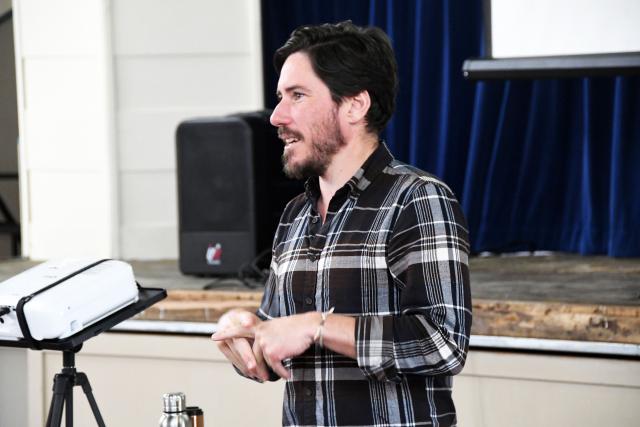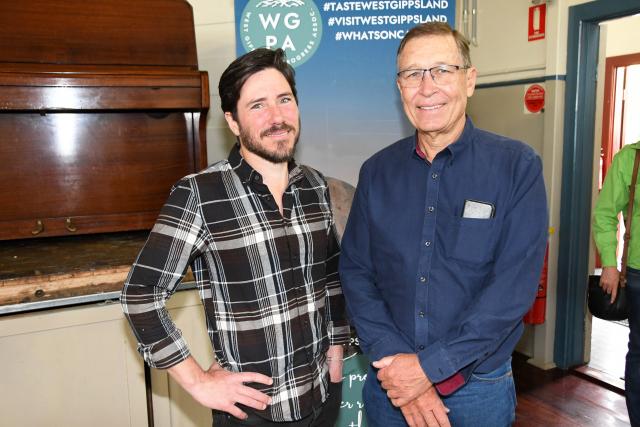
By Corey Everitt
PRECEDE: Farmers near and far gathered at Bunyip Hall last week to hear from internationally renowned plant and soil health expert Joel Williams. The day marked the continued development of local farmer expertise and knowledge in regenerative agriculture, discussing all the ways to maximise crops and retain the soil at the level of the pasture right down to each natural chemical.
BREAK OUT QUOTE: “I thought it was brilliant, by far the best regen-arg event I have seen.”
The full day event was organised by the West Gippsland Progress Association (WGPA), seeing over 70 people gather on Tuesday 12 March from 9am to 3pm.
Farmers gathered to hear lectures and discussion from Joel Williams, a prominent expert on all things soil and plants.
Mr Williams has done extensive field research across the world from Australia to the United State to the United Kingdom. He has studied Agricultural Science and Food Policy, he guest lectures at South East Technological University in Ireland and has been a part of projects at the University of Roehampton in the UK.
His work today is mostly in educational and consultation work of lecturing and running workshops for groups across the world.
The work deals in complex details in agriculture, from vital minerals in the soil to the diversity of grass species.
Mr Williams’ knowledge helps provide the ways in which farmers can engage in sustainable agriculture, not just for environmental concerns but also to garner more resilient soil, healthy pasture and strong crop yields.
He may talk about complex matters, however his success comes from his pursuit to make it accessible to farmers.
His stop last week at Bunyip Hall saw him give three sessions, one on the topic of diversifying pastures, another on plant and soil nutrition and the last on Foliar Fertilisers.
Meat Me at the Gate’s Simon Beard, an Officer South based grass-fed beef producer, attends a lot of local workshops and said this was the best so far.
“I thought it was brilliant, by far the best regen-arg event I have seen,” he said.
“Had a lot of data, but was able to bring it across easily, he was really good at relating it back to some real world stuff.”
A key session for Mr Beard was Mr William’s talk about diversifying pastures.
Instead of the usual homogeneity of ryegrasses or clover, experts like Mr Williams have been arguing for the benefits of several different species in a pasture.
The benefits provide better diversity for the soil, providing more coverage of roots which can help aerate and loosen up the soil with more organic matter.
“It’s trying to get away from monoculture,” Mr Beard said.
“It’s not just good for soil health, but different grass has different nutrients, it’s healthier for the animals to have a wider diet and that’s what they are trying to push for today.”
Mr Williams is also a part of the new concern for soil health and plant nutrition. Farmers are thinking about more than getting more nitrogen in the ground, but potassium, phosphorus, calcium, all the nutrients that make up the fine balance of a fertile soil.
They are getting their soil tested to see its balance of nutrients and minerals, and making ways to better the balance.
This is both an outcome of a world attempting to move away from the old ways of monoculture and the use of artificial products, as well as a new excitement about the better yields a farmer can get from working with the soil sustainably.
Committee member for the Western Port Catchment Landcare Network, Jim Armstrong has seen Mr Williams speak many times through the years and has seen sophistication and curiosity of local farmers increase.
“Over the many years you have seen the farmers’ knowledge grow and grow, farmers are asking different questions today, looking into different methods in agriculture.”
“With people like Joel, knowledge is growing.”
Mr Beard appreciated the sharing of key knowledge on soil and plant health.
“The chemical makeup of plants and their minerals was very interesting, if you’re deficient in one area it’s going to hold it all back.”
“It’s about trying to tweak a few things and make it sustainable over time, and it’s something we have got to get to at some point.”
Possibly the most pertinent shift is the need to move away from artificial fertilisers. Concerns over the use of such fertilisers like urea and its damaging effects on the soil over time.
Farmers are seeking alternatives that both protect the land and the soil, but also still create quality produce.
Mr Williams’ last session for the day was on Foliar Fertilisers. These are based on using organic, natural products for the land which are applied in a liquid form directly on plants where their leaves absorb nutrients quickly.
Foliar Fertilisers present an alternative to traditional soil-based fertilisers that are both potentially more sustainable and quicker in getting nitrogen into the soil.
Mr Armstrong is impressed by some of the promising signs so far and hopes to see the local area join in trying out Foliars.
“For me, the take home message was to get out and try this liquid nitrogen, instead of urea,” he said.
“Urea on it’s own is damaging to the soil, it kills the carbon in soil and destroys fertility.”
“Where with liquid nitrogen, you can add different things and you can retain the strength of the soil.
“While it’s also apparently five or six times more efficient for yields.
“Now it’s not a matter of saying that was a nice day, what do we do now?
“We now are going to get out there and into it.”
For organiser and committee member of WGPA, Tony Morgan the day was a significant success, the likes of which the group hopes to establish on a biannual basis.
Mr Morgan is also from Orchard End Farm in Bayles where their production of beef, as well as organic blueberries has benefitted immensely from sustainable agricultural practices.
“Joel is a great communicator, and especially in a way that simplifies things, a lot of us were looking at our processes and thinking oh that’s how that works,” he said.
“I think just the validation we have used on, when he explained the chemistry it’s oh that’s why those things actually work.
“If we can repeat meetings like this every six months, we will be really helping establish regenerative farming in the local area.”
You can keep in touch with WGPA at their facebook page, facebook.com/WestGippslandProgAssoc
You can also learn more from Joel Williams at integratedsoils.com

